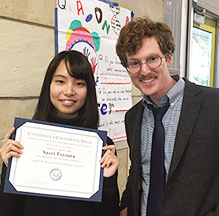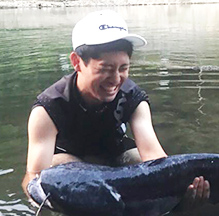Diversity and Global Initiatives

01
Diversity on Campus
University with more than 30,000 students
Ritsumeikan University consists of 16 colleges on three campuses. With more than 30,000 students and over 400 extracurricular clubs and circles, there are myriad opportunities for students to have diverse encounters. More than 13,000 students study on the vast Biwako-Kusatsu Campus (BKC), where the College of Pharmaceutical Sciences is located. The BKC provides students with a comfortable learning environment that supports independent learning and study spaces equipped with a diverse information environment.
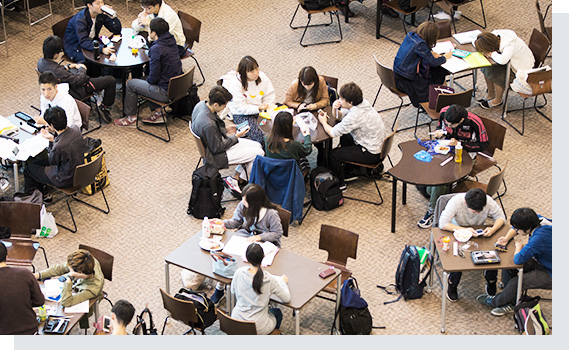
Liberal arts education in diverse fields
The diverse liberal arts education options that are common to all colleges are another feature of Ritsumeikan University. This is something that is only possible in a general university. Knowledge outside one’s own field of expertise nurtures a diverse general education, worldview, and values. That is the “Ritsumeikan Standard.” On the research front, initiatives that go beyond the boundaries between the humanities, social studies, and the sciences have created a culture that delivers highly original outcomes that are a fusion of different domains.
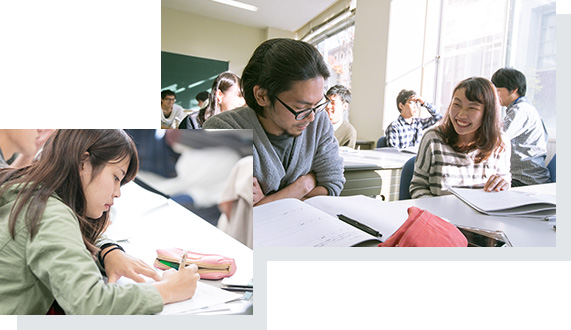
Environment that supports students’ lively activity
In addition to educational facilities, Ritsumeikan has a sports ground and swimming pool and has established an environment that encourages students to engage in various extracurricular activities and supports their physical and mental well-being in their lives on campus. Various incentives and scholarships are available to support students’ activities. This encourages them to learn through independent activities both in regular class time and in extracurricular activities.
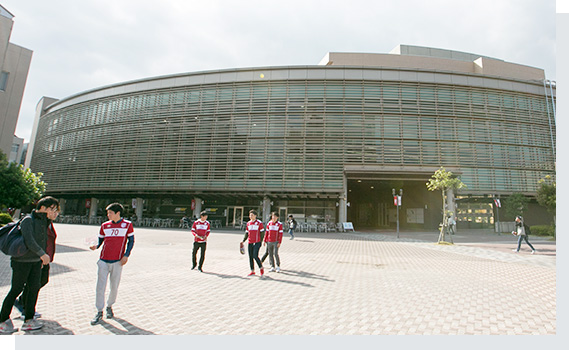
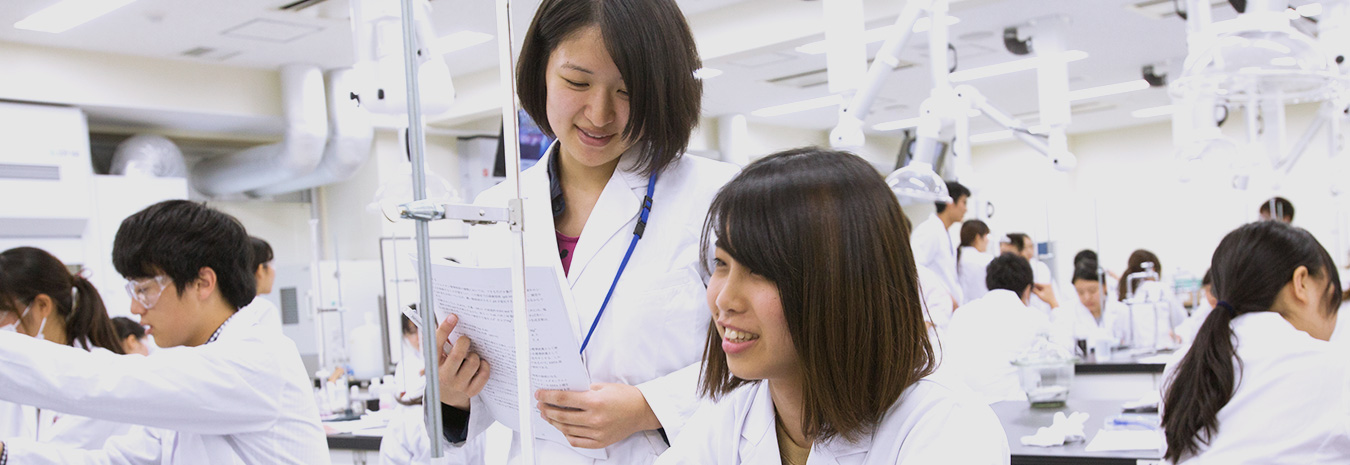
02
Peer Learning
Peer Learning and Peer Support
Peer Learning and Peer Support are traditional initiatives at Ritsumeikan in which students learn from each other, both in regular class time and in extracurricular activities. In the Department of Pharmacy (6-Year Program) of the College of Pharmaceutical Sciences, as a part of the Peer Support initiative, a Ph.A (Pharma Assistant) program has been introduced, involving 5th and 6th Year students offering guidance and support in class to 1st and 2nd Year students. Due to the small intakes of approximately 160 per year, students in the College of Pharmaceutical Sciences are very close to each other, transcending the barrier of year levels. Leveraging these strong bonds, in AY2015, the Department of Pharmacy introduced a practical experience program in which 6th Year students, as Ph.As, take on the role of lecturers in the “Pharmaceutical Basic Seminar” for 1st Year students.
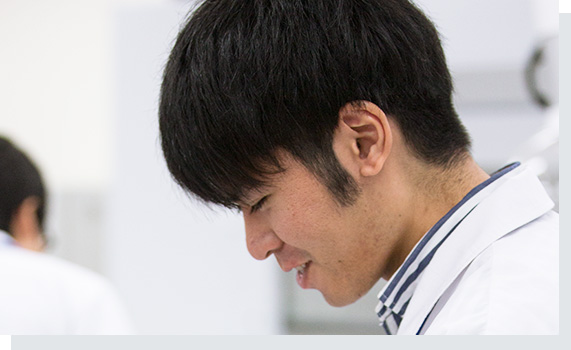
The major objective of this program is to help 1st Year students to picture themselves in six years’ time, while experiencing practical skills such as the preparation of powder medicines and liquid medicines under the guidance of the Ph.As (6th Year students) who have achieved growth after completing their practicums at hospitals and pharmacies. This program also benefits the 6th Year students, who are given the opportunity to improve their communication skills and to come up with better ways to convey information in their position as teachers. This is how students can grow through friendly competition with each other, transcending differences in year levels and experiences.
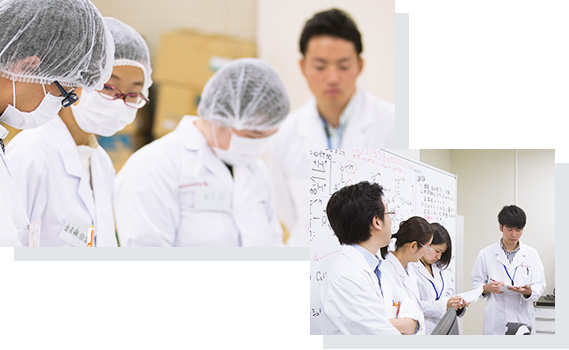

03
Communication Skills for Medical Professionals
Communication Seminar
Students who want to become pharmacists need to have advanced communication skills as healthcare professionals, so they can build relationships of trust with patients and with other members in team-based medical care. The subject, “Communication Seminar,” delivered in 1st Year in the Department of Pharmacy, aims for students to gain knowledge, techniques, and practical skills in basic interpersonal communication, as a first-step or introduction to mastering such advanced communication skills.
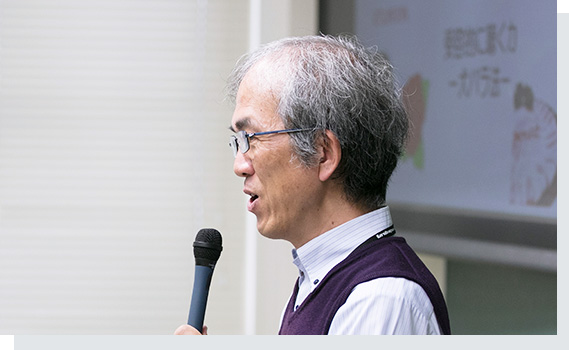
In this exercise, students aim to acquire various skills, including listening to others in an appropriate manner, understanding the thoughts and feelings of others by asking questions, and conveying their own thoughts and feelings to others in appropriate ways. Through small group work, role playing, discussions, and presentations, students will learn practical skills such as what is required of a listener, receptive listening, conveying information from the listener’s perspective, giving on-target directions, and talking with the listener’s feelings in mind. Assertion training and anger management training are also provided. In the second half of the 15 sessions of this exercise, students will watch DVDs that simulate how pharmacists deal with patients at a pharmacy and evaluate the pharmacists’ attitudes. They will also perform role plays between students and with mock patients, to deepen their understanding of communication in healthcare settings.


04
Experience of the Expanding Practical Duties of Pharmacists in the Community
Applied Pharmacy Exercise
The subject, “Pharmaceutical Advanced Seminar” delivered in 2nd Year of the Department of Pharmacy, aims to deepen students’ understanding of healthcare and welfare services in the community as people who will one day work in actual healthcare settings. This is done through exercises such as “medical assistance in disasters,” “handicap experience (wheelchair, impaired vision),” “welfare facility visit,” “dialogue with patients suffering harmful side effects of a medicine or drug,” and “human body autopsy practicum.” In the wheelchair part of the “handicap experience,” students will experience operating a wheelchair, boarding and alighting an elevator, and climbing up and down staircases with assistance. In the impaired vision experience, students will don an eye mask and walk with a white cane, climb up and down staircases, and experience what it is like to read and write with Braille. The College of Pharmaceutical Sciences offers an environment in which, from the early years of the course, students will develop a perspective as pharmacists that is rooted in actual society.


05
English Education
Ritsumeikan University has been selected for the Ministry of Education, Culture, Sports, Science and Technology (MEXT) Top Global University funding project. It collaborates with overseas universities in many different ways and conducts education and research of a global standard. The College of Pharmaceutical Sciences is placing efforts into English language education to develop in its students the English language abilities and information communications skills that will help them to play active roles in the global arena. It also offers a study abroad program that is tailored to the College’s specialized domains.
Project Based English Language Program
In the life sciences area, which has been described as the most advanced in terms of internationalization, projects of a global scale are conducted. Life sciences experts gather from all over the world to exchange information and opinions and to communicate their outcomes through oral presentations at international conferences and in scientific papers and reports. In Ritsumeikan’s English-language education program, students select cutting-edge research in the life sciences and pharmaceutical sciences as project themes, gather information from all over the world, discuss it, and cultivate the foundational skills for communicating their outcomes in English. In the English language program in the lower year levels, students from the College of Pharmaceutical Sciences and College of Life Sciences study together in the same classes. The classes consist of two main pillars - “Project” classes (subject titles: English P1-4 and English JP 1-2) and “Skills Workshop” classes (subject titles: English S1-4).
In the Project classes, students set their own project theme, explore their own thoughts about that theme, and communicate their findings. In 1st and 2nd Year, they select themes that interest them from their own daily lives, extracurricular activities, and classes. 3rd Year students select themes from their fields of specialization and undertake projects of a more academic nature. These classes are not organized by skill level. In the Skills Workshop classes, students develop the four skills of listening, speaking, reading, and writing. The skills they develop in these classes are put to good use in the Project classes in the exchange of opinions and information, presentations, and academic writing. These classes are organized by skill level. If students want to participate in international projects in the future, they need to be able to utilize digital media. All class activities in both the Project and Skills Workshop classes are posted online using Web course tools and other digital tools. The ultimate goals of these English programs are for graduating students to achieve the specific outcomes of (1) summarizing the main points of their graduation thesis in English and presenting it orally as part of their graduation research, and (2) achieving a TOEIC score of over 600.
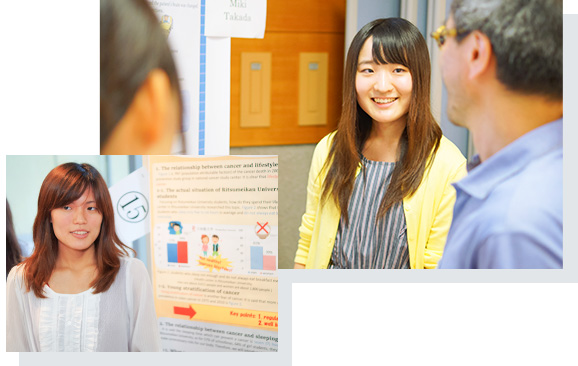
Science & Technology Program
The Science and Technology Program is a study abroad program for the lower year levels conducted jointly by the College of Life Sciences, College of Pharmaceutical Sciences, College of Sport and Health Science, and College of Comprehensive Psychology. The aims of this program are to improve students’ English language abilities and to study cutting-edge science and technology fields in English. The classes center on group work and presentations, through which it is hoped students will improve their pronunciation and presentation skills. This is a very fulfilling program, in which, once a week, the students visit a laboratory or research facility on campus or a local company, where they can encounter cutting-edge research. Outside class, various events are planned for Ritsumeikan students to interact with the UC Davis students, during which they can put the English they have learned into practice while having fun.

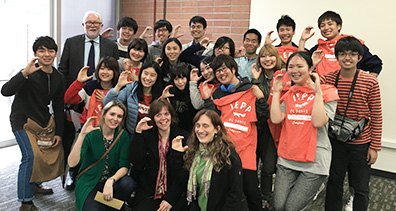
University of California, Davis
Located in a safe part of northern California, the University of California, Davis is close to San Francisco, Sacramento, and Yosemite. It was originally established as an agricultural college and is now one of the top universities in fields such as agriculture, agribusiness, life sciences, and botany. It is one of the largest colleges in the University of California group in terms of area and has more than 33,000 undergraduate and graduate students on its vast campus.
University of California, Davis
"Science & Technology
Program" Experience
Clinical Pharmacy Clerkship in Foreign Country
The Toronto Clinical Training Program (TCTP) is a study abroad program for 5th Year students in the Department of Pharmacy who aspire to become pharmacists. The aim of this program, which is held after the 5th-Year hospital/pharmacy practicum, is to instill in students of the Department of Pharmacy, who will one day work as hospital pharmacists and in pharmacies and companies, an international outlook and rich values by learning about the systems and duties of pharmacists in Canada. While in Toronto, the students are able to experience the work of a pharmacist as a member of a medical team through opportunities to attend conferences and interact directly with patients at The Hospital for Sick Children (SickKids) in Toronto, Canada, which provides leading-edge pediatric medical care. The program also includes lectures in the University of Toronto’s Pharmacology program and time to interact with students in that program.
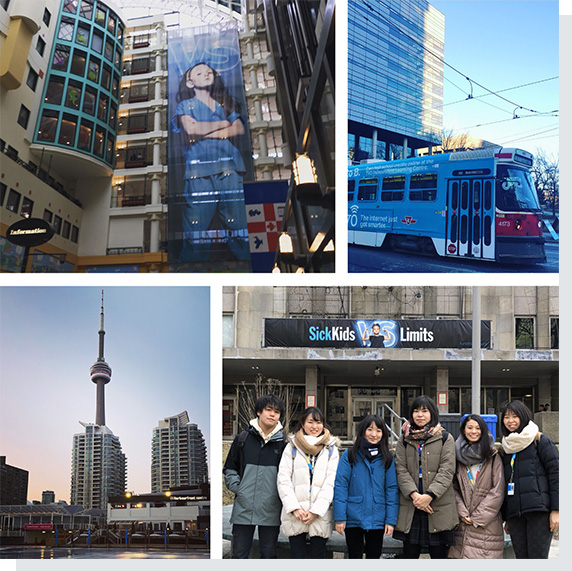
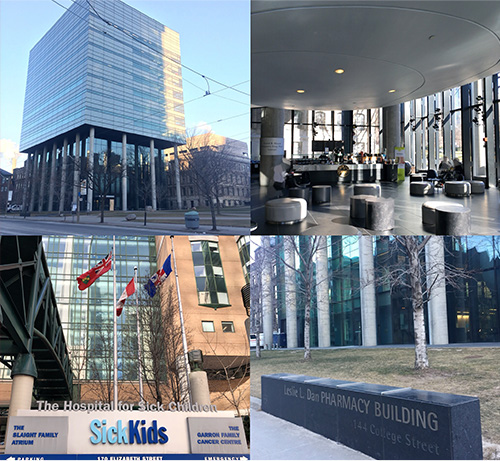
The Hospital for Sick Children (SickKids) and University of Toronto
The Hospital for Sick Children (SickKids) is an affiliated hospital of the University of Toronto. It is Canada’s largest key research hospital in the area of the promotion of children’s health. As well as providing world top-class pediatric medical care by staff in all manner of medical and research fields, it welcomes many medical practitioners and researchers from all over the world for study and training for pharmacists. SickKids international: http://www.sickkidsinternational.ca/
Founded in 1827, the University of Toronto is one of Canada’s most prestigious universities. It has approximately 85,000 undergraduate and graduate students. The Pharmaceutical Sciences program of the University of Toronto is famous as the alma mater of Frederick Banting, who co-discovered insulin and was awarded the Nobel Prize in Medicine. University of Toronto: https://www.utoronto.ca/


